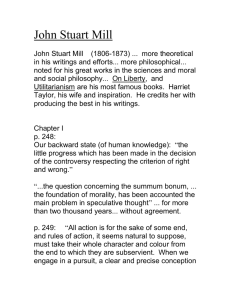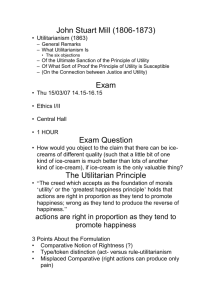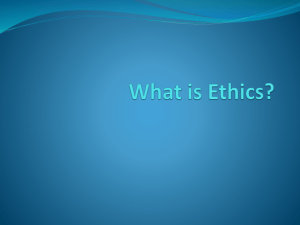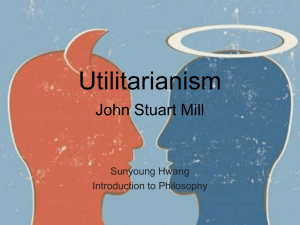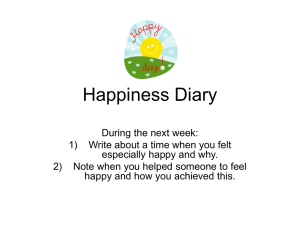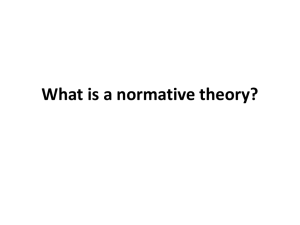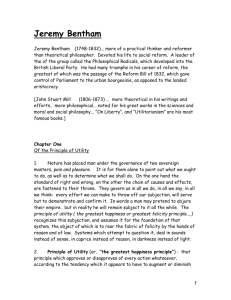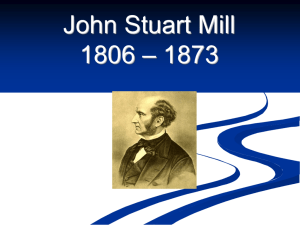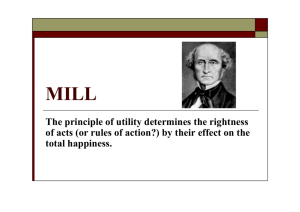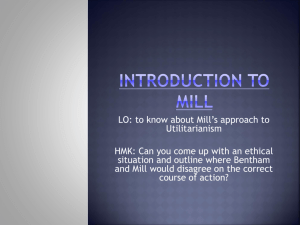John Stuart Mill: Utilitarianism Ethical Theory PL 3100 Dr. Morris I
advertisement
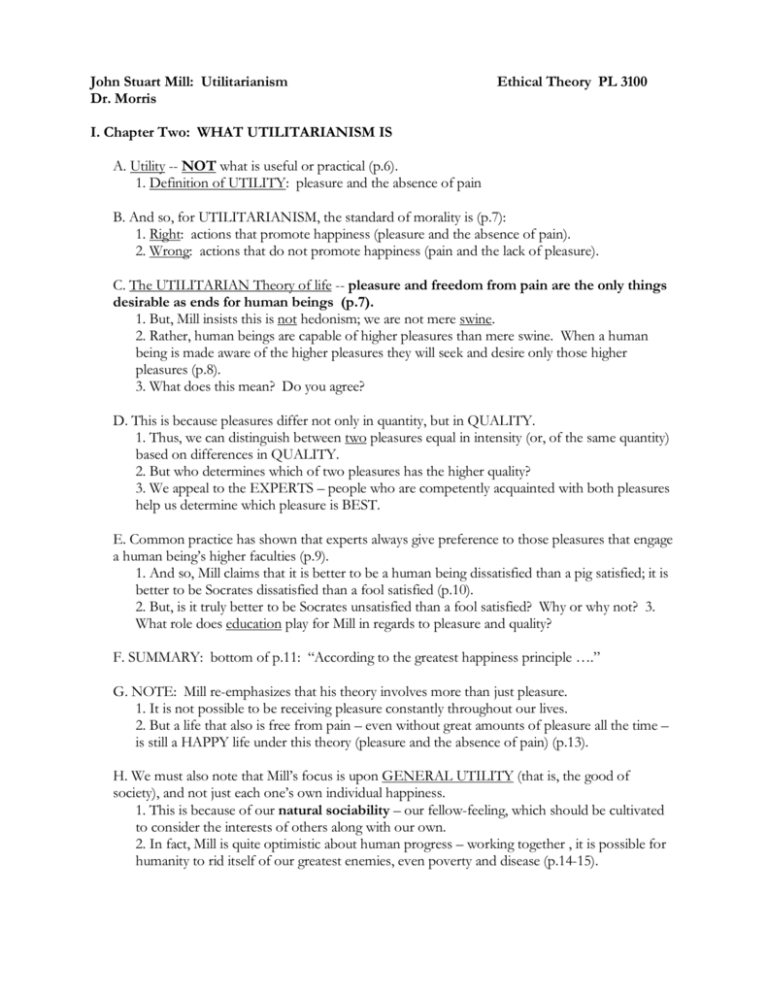
John Stuart Mill: Utilitarianism Dr. Morris Ethical Theory PL 3100 I. Chapter Two: WHAT UTILITARIANISM IS A. Utility -- NOT what is useful or practical (p.6). 1. Definition of UTILITY: pleasure and the absence of pain B. And so, for UTILITARIANISM, the standard of morality is (p.7): 1. Right: actions that promote happiness (pleasure and the absence of pain). 2. Wrong: actions that do not promote happiness (pain and the lack of pleasure). C. The UTILITARIAN Theory of life -- pleasure and freedom from pain are the only things desirable as ends for human beings (p.7). 1. But, Mill insists this is not hedonism; we are not mere swine. 2. Rather, human beings are capable of higher pleasures than mere swine. When a human being is made aware of the higher pleasures they will seek and desire only those higher pleasures (p.8). 3. What does this mean? Do you agree? D. This is because pleasures differ not only in quantity, but in QUALITY. 1. Thus, we can distinguish between two pleasures equal in intensity (or, of the same quantity) based on differences in QUALITY. 2. But who determines which of two pleasures has the higher quality? 3. We appeal to the EXPERTS – people who are competently acquainted with both pleasures help us determine which pleasure is BEST. E. Common practice has shown that experts always give preference to those pleasures that engage a human being’s higher faculties (p.9). 1. And so, Mill claims that it is better to be a human being dissatisfied than a pig satisfied; it is better to be Socrates dissatisfied than a fool satisfied (p.10). 2. But, is it truly better to be Socrates unsatisfied than a fool satisfied? Why or why not? 3. What role does education play for Mill in regards to pleasure and quality? F. SUMMARY: bottom of p.11: “According to the greatest happiness principle ….” G. NOTE: Mill re-emphasizes that his theory involves more than just pleasure. 1. It is not possible to be receiving pleasure constantly throughout our lives. 2. But a life that also is free from pain – even without great amounts of pleasure all the time – is still a HAPPY life under this theory (pleasure and the absence of pain) (p.13). H. We must also note that Mill’s focus is upon GENERAL UTILITY (that is, the good of society), and not just each one’s own individual happiness. 1. This is because of our natural sociability – our fellow-feeling, which should be cultivated to consider the interests of others along with our own. 2. In fact, Mill is quite optimistic about human progress – working together , it is possible for humanity to rid itself of our greatest enemies, even poverty and disease (p.14-15). I. Self-sacrifice, in the UTILITARIAN theory is not a good in itself – sacrifice is only a good if it increases the good of others (p.15). 1. A sacrifice that fails to increase the sum total of happiness is wasted (p.16). J. Re-emphasizes that UTILITARIANISM focuses upon the good of the whole – not the individual. 1. This is sometimes referred to as the greatest happiness of the greatest number of people. 2. To achieve this, one must consider one’s personal interests as equal to those of others, and give no greater weight or preference to one’s private interests than to the rest of the community (p.17). 3. In short, for Mill, morality is entirely social – individuals do not count as individuals, but only as parts of the society as a whole. K. But some object that this ethical theory demands too much of human beings by insisting that we always try to promote the greatest happiness (p.17). 1. Most of our actions only affect those immediately around us – few of us really have the chance to promote the well-being of humanity on a large scale (p.18-19). 2. Mill insists that this in keeping with his theory – as long as we work for the good of those around us, we are living up to the standards of UTILITARIANISM. L. Mill concludes this chapter by considering some of the common misconceptions about UTILITRIANISM (p.21-25). II. Chapter Three: OF THE ULTIMATE SANCTION OF THE PRINCIPLE OF UTILITY A. Mill now addresses why are we obligated to promote the general happiness? (p.26) 1. First, there are certain external motivations/sanctions for promoting the greatest happiness of others: fear of God, and/or other people; and, the hope of rewards from God and/or other people (p.27). 2. But there we also have an internal motivation/sanction: the subjective feeling of pain we get from violating our 'duty' -- this is the essence of conscience (p.28). B. But is this moral feeling, or conscience, innate or implanted? 1. Mill claims this does not really matter for his argument, but he offers his own account anyway. He argues that conscience is acquired through moral training and education (p.30). 2. Mill goes on to explain that our moral feelings are supported by our natural sociability, or fellow feelings for the rest of mankind. And, since society is not possible without equality – to live together (which we naturally want to do), we must consider the interests of every member of society equally (p.30-31). 3. Thus, the longer we live in society, the stronger our social bonds become. Consequently, we identify our own good with the good of others – to the point that considering the good of others becomes something very natural to us as social beings.

